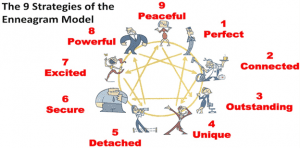Ever been perplexed why some people don’t think or feel the same way you do? Each person’s innate underlying motivation may provide the answer. The Enneagram is a powerful personality system with nine distinct personality dynamics. Each dynamic has a unique motivational force. In this video, I briefly explain the nine distinct motivations underlying each Enneagram type. This video will help you understand different types of teammates.
Enneagram Motivation Video
Start times for each of the Enneagram motivations:
Enneagram 1 motivation 3:40
Enneagram 2 motivation 6:45
Enneagram 3 motivation 10:00
Enneagram 4 motivation 8:15
Enneagram 5 motivation 13:05
Enneagram 6 motivation 14:35
Enneagram 7 motivation 11:45
Enneagram 8 motivation 2:00
Enneagram 9 motivation 5:05
Transcript:
Hi! Thanks for joining me today. Today we’re going to cover the nine distinct motivations described by the Enneagram.
The Enneagram is a personality system that describes nine types, and each one of those types has a distinct underlying motivation associated with it. So let’s get into it.
So here you see the Enneagram diagram, with the nine types. And you can see that it can be broken up into three groups of three. These three groups are commonly called centers, or triads. And you have the gut center, you have the heart center and you have the head center. And in each one of these centers there’s an underlying driving dynamic associated with it.
For the gut center, that dynamic is anger. For the heart center, its feelings or emotions. For the head center, its anxiety. Each one of these types in a center can have either an external expression of the dynamic, an internal expression of the dynamic or a suppressed expression of the dynamic, where suppressed means that that type is trying to minimize or eliminate that driver from their lives.
Let’s start with the gut center. Here you have the external, internal and suppressed. So we’ll start with the external anger Type 8. The Type 8, what they’re trying to do is to secure control of their environment. Their go to tool for doing that is anger. So the 8s use anger to maintain control of their environment. So if you’re in a meeting with somebody and you see them starting to raise their voice or get big or pound the table or point their hand like it’s a hammer: all of those are expressions of that Type 8 dynamic of using anger to get back control when they think that they don’t have control. So the 8s tend to be very decisive and they tend to be very confident and that’s why they often migrate to leadership roles and I think that both Winston Churchill and also Elaine Louis-Dreyfus Seinfeld represent that Type 8 dynamic. I love it when Elaine will go up to somebody and just push them. That is that Type 8 dynamic happening. That is why they’re called the asserter as well.
Next, let’s go to the internal anger Type 1. Instead of all that anger that you see going outward externally with the 8, now imagine it’s all inside of them, and it’s focused inside themselves. It takes the form of this angry voice in their head, saying “you know that’s not right, you know could be working harder, you know you could be doing better.” That little voice in their head is compelling the Type 1 to “get it right.” That is why the Type 1 is often called the perfectionist. Sometimes they’re called the reformer, or the improver, but it’s all about that dynamic of them following that voice that’s telling them they need to do better, they need to get it right. Type 1’s are drawn to roles in which precision, accuracy and also principles really matter. I think that Elizabeth Warren and Mohammed Ghandi both represent that Type 1 dynamic well.
Next we have the suppressed anger. Remember they want to eliminate anger from their environment, so they are compelled to reduce conflict. That is what is motivating them, because then they can eliminate anger. By knowing and anticipating people’s opinions, perspectives and needs, then by going in and working with them they can minimize any chance of having a conflict or anger. They tend to be drawn to roles in which they can serve as a mediator. They’re not afraid of anger, they’ll go towards it, but they’ll work to eliminate it. That’s why they’re called the peacemaker. I think that Donna Moss in the West Wing role represents that dynamic of anticipating Josh’s needs and fulfilling them and also Woody Harrelson in the role of Cheers also has that calm demeanor of anticipating people’s needs.
Now we’re moving to the Heart center, where it’s about feelings and emotions. There are external, internal and suppressed so we’ll start with external.
The external emotion type is the Type 2. The Type 2 wants to have an emotional connection with you. That’s the external part. And the way they get that emotional connection with you is by helping you. When they help you, in return, they get appreciation. For the 2, appreciation is like oxygen. But it is evidence that that’s how they created that emotional connection with you. So they’re constantly helping and receiving their oxygen, their appreciation. Type 2s tend to migrate to roles where they can serve other people. For example service roles, and by helping people they can in return get that appreciation. That’s very fulfilling for the Type 2. Who doesn’t appreciate nurses? I think nurse Jackey in her role represents that Type 2 dynamic. And who doesn’t appreciate Santa Claus, for bringing us gifts? That’s another example of that Type 2 dynamic.
Next we have the internal emotional Type 4. For the Type 4s, they want to just experience feelings. They’re constantly reacting to feelings. So they immerse themselves in experiences that evoke a lot of feelings. The Type 4s, if you ask them “how are you feeling,” they might just say, I’m feeling fine, but what they’re really thinking is “well I’m feeling the color of the slide, I’m feeling the warmth of the light, I’m feeling the sound in the room, I’m feeling all of these things but if I told you that, you’d think I’m crazy, so I just say ‘I’m feeling fine.’” That’s what’s going on in the Type 4. Not only are they able to feel all these things that are around them, they can feel the emotional content of everything, but they can also express themselves in emotional impactful ways and evoke feelings in others. That is why they’re drawn to roles in which they can do that. Those tend to be artistic roles: music, poetry, writing. I think that both Janice Joplin and Bob Dylan really exemplify that Type 4 dynamic.
Next we have the Type 3, the suppressed feeling. They don’t want feelings. They’re not worried about feelings at all. Rather than appreciation like the 2s or being thought of as having a unique perspective like the 4, what they’re after is acknowledgement for their success. The 3s work hard to succeed. I would say out of all the types, Type 3s are the hardest working. They’re going to work all night if they need to, nothing is going to stop them. They’re doing that because failure is not an option. They must succeed. They’re drawn to roles where they can very easily measure their success and then also show other people, demonstrate that success to others. They’re doing that so they can get that recognition for being successful. That’s why they’re called the achiever. I think that the tremendously successful Oprah Winfrey and Jerry Seinfeld both exemplify that Type 3 dynamic.
Next we’re moving to the head center, and again there is external, internal and suppressed but this time it is anxiety.
Let’s go to the external anxiety Type 7. People don’t commonly associate anxiety with the Type 7, but that’s what’s underlying their desire to be liked. They want to be liked. If they’re liked, anxiety goes down. If they’re not liked, anxiety goes up. So they tend to be very engaging, charming, talkative, fun. They are doing all this to engage with the people around them, so that they will be liked by them. As long as everyone’s having fun and having a good time and laughing and merry, then the 7’s anxiety goes down. So that’s what’s going on, that’s how they alleviate their anxiety. They’re drawn to roles where they can do fun, new things with other people all the time. Those are great roles for the 7. I think that both Betty White and Eddie Murphy are great examples of that exuberant, fun dynamic of the Type 7.
Now we go to the internal anxiety types. That anxiety is rolling around inside. As long as 5s feel safe, their anxiety goes down, and the way they can feel safe is by collecting resources that make them feel safe. The types of resources that make the 5s feel safe are certainly money, is a good one, and information and knowledge. Now 5s tend to be quiet. If they’re in a meeting with a lot of people, they’re just going to be sitting there quietly. But that doesn’t mean that they’re not engaged. They’re observing everything, they’re taking everything in. They’re collecting information about everybody. That’s why they’re often called the observer and they’re drawn to roles in which they can collect a lot of information, they tend to be very cerebral type roles. I think that Agatha Christie and Bill Gates both represent that Type 5 dynamic.
Finally, we have the suppressed anxiety Type 6. They want to eliminate anxiety and the way they do that is if they know what’s going to happen they can avoid risks and make their anxiety go down. So they’re constantly avoiding risks. When they sense risks coming up, their anxiety comes up. So they want to find a path forward with the fewest risks. The 6s are constantly anticipating the future, thinking about the future, thinking about the future, asking about the future. That’s why they’re called the questioner, because they’ll ask a lot of questions about “what if this happens, what if that happens, what happens when this happens, what happens when that happens,” going down this path to try to understand all contingencies to find the least risk path forwards. They’re drawn to roles in which there is a lot of predictability and consistency. So they’re perfectly tuned for those types of roles. The other thing is because they have this deep seeded anxiety in them, they can at times tend to have somewhat neurotic behaviors. Those can come out, and I think that Julia Roberts plays a lot of Type 6 roles in her work, and also Larry David exemplifies the Type 6.
Thank you so much, those are the 9 underlying motivations of the Enneagram types. I’ve enjoyed talking to you today and I look forward to our next opportunity.



